

Fóruns de Hardware e Performance. Read this first!
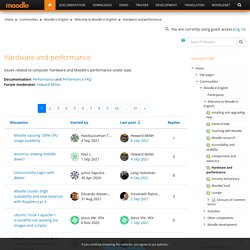
This forum is for discussing issues related to computer hardware for Moodle, as well as comparing notes on Moodle's performance under load. Advice on finding an internet hosting service also belongs here. Before posting your question here please read the documentation Performance and and Performance FAQ. Many of the questions have already been answered. Please make use of the Advanced forum search and the Google custom search to find them. If your questions still remain unanswered, post them here. Moodle Technical Recommendations. Sumultaneidade. From MoodleDocs How do you define "concurrent users"?
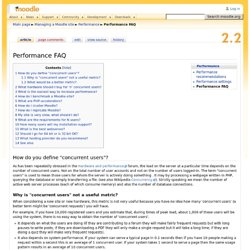
As has been repeatedly stressed in the Hardware and performance forum, the load on the server at a particular time depends on the number of concurrent users. Not on the total number of user accounts and not on the number of users logged-in. The term "concurrent users" is used to mean those users for whom the server is actively doing something . It may by processing a webpage written in PHP, querying the database or simply transferring a file. Why is "concurrent users" not a useful metric? When considering a new site or new hardware, this metric is not very useful because you have no idea how many 'concurrent users' (a better term might be 'concurrent requests') you will have. For example, if you have 10,000 registered users and you estimate that, during times of peak load, about 1,000 of those users will be using the system, there is no easy way to obtain the number of 'concurrent users'.
What would be a better metric? Recomendações 1k simultaneos. 1k simultaneous quiz takers. I am sure that nobody knows the answer to this type of question.
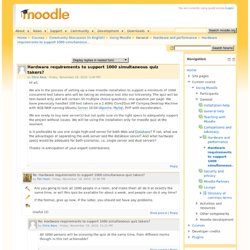
My recent script (look for 'e-peen' thread title) was an attempt to help give approximate answers, but nobody much has actually run it yet so we don't have a dataset of how different systems score, nor any confirmation that the script corresponds in any way to real usage. Maybe that script is no good either... If you have already done this test with 100 people you should be able to work out the number of Moodle php requests per second that this caused.
This is the most useful concurrency figure (not number of users - requests per second, and what type of requests they are). Once you have that number, if it was obtained from tests in a similar environment, you can hopefully just multiply by 10 to get your target. Using this information, you might be able to create a script in a load testing system such as JMeter which makes that many requests to a quiz page of a similar kind. --sam. 55 Simultaneos. 40k Simultaneous. 160 Simultaneous Users. Here is a report of the server operation for administering a 50 question m/c language placement test with embedded audio to 160 freshmen on April 5.
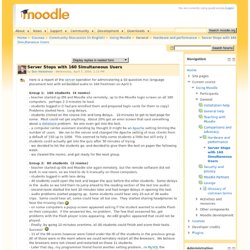
Group 1: 160 students (4 rooms) - teacher started up IE6 and Moodle site remotely, up to the Moodle login screen on all 160 computers. perhaps 2-3 minutes to load. - students logged in (I had pre-enrolled them and prepared login cards for them to copy) Problems started here. Long delays. - students clicked on the course link and long delays. 10 minutes to get to test page for some. Most could not get anything. About 20% got an error screen that said something about a database problem. No one even got into the test. - a computer center assistant standing by thought it might be an Apache setting limiting the number of users. . - on some computers a popup screen appeared asking if the student wanted to enable Flash on their computer.
. - 11 of the 80 scores however were listed under the ID of the students in the previous group. 10K simultaneous. Yes Moodle can run quizzes, compute statistics, and export the results in Excel format.
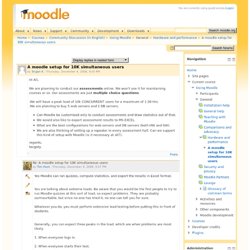
You are talking about extreme loads. Be aware that you would be the first people to try to run Moodle quizzes at this sort of load, so expect problems. They are probably surmountable, but since no-one has tried it, no one can tell you for sure. Whatever you do, you must perform extensive load testing before putting this in front of students. Generally, you can expect three peaks in the load, which are when problems are most likely. 100k + 10k simultaneous. 3K simultaneous. Hi Visvanath, - 3000 simultaneous users - only one course, about introducing a new product - it is already available in SCORM - it uses dhtml and flash - users don't _interact_ in any way (uploading files, writing into forums, editing wikis/ blogs , chatting, .. none)
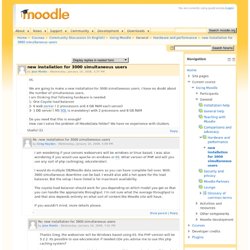
Perspective.php. Hi all.
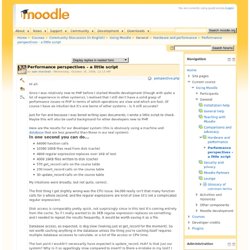
Since I was relatively new to PHP before I started Moodle development (though with quite a lot of experience in other systems), I realised that I still don't have a solid grasp of performance issues re PHP in terms of which operations are slow and which are fast. Of course I have an intuition but it's one borne of other systems - is it still accurate? Just for fun and because I was bored writing spec documents, I wrote a little script to check. Maybe this will also be useful background for other developers new to PHP.
Here are the results for our developer system (this is obviously using a machine and database that are less powerful than those in our real system): In one second you can do... The first thing I got slightly wrong was the CPU issue. 64,000 really isn't that many function calls for a whole second, and the regular expressions are kind of slow (it's not a complicated regular expression). The last point I wouldn't necessarily have expected is update_record. --sam. Quiz performance with large concurrency. > However, I resent your implied criticism of the quality of the quiz code. > There are very few of those sort of stupid performance SNAFUs left, > particularly with the addition of caching in Moodle 2.4. I apologize about not being clear that I was not commenting on the Quiz code.
Quiz itself is good quality. Loading a quiz page is not significantly more resource intensive than loading the Moodle home page. Lighttd vs. apache. I'm still using my old klunker of a 800Mhz PIII with 256MB of ram also, but with Apache running Moodle 1.6.2 under EdUbuntu .
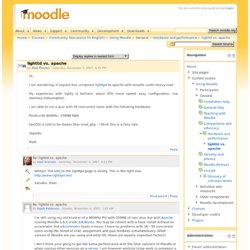
You may be correct with a base install without an accelerator, but eAccelerator busts a move; I have no problems with 30 - 50 concurrent users using the mired of chat, assignment and quiz modules simultaneously. What version of Moodle are you using and what OS, these are equally important factors? I don't think your going to get the same performance with the later versions of Moodle or when running other services on a server . I am however working (slow work in progress) a new machine that is memory and processor rich in comparison using either Moodle 1.6.3 or 1.8.? (I use the question mark as by the time I get off my lazy butt it'll be version 2.0.1 - the machine is up and working, but I've drug my feet in migrating the files). Minimum Apache Modules to run Moodle 2. Performance tuning Moodle. Lighttpd, NginX and Cherokee performance. From MoodleDocs Moodle can be made to perform very well, at small usage levels or scaling up to many thousands of users.
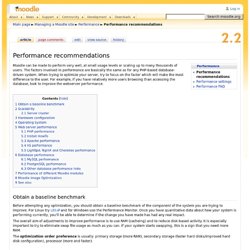
The factors involved in performance are basically the same as for any PHP-based database-driven system. When trying to optimize your server, try to focus on the factor which will make the most difference to the user. For example, if you have relatively more users browsing than accessing the database, look to improve the webserver performance.
Obtain a baseline benchmark. Apache Performance. From MoodleDocs.
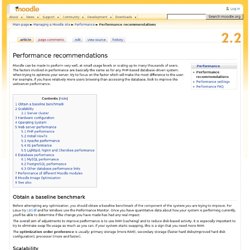
PHP Performance. From MoodleDocs Moodle can be made to perform very well, at small usage levels or scaling up to many thousands of users. The factors involved in performance are basically the same as for any PHP-based database-driven system. When trying to optimize your server, try to focus on the factor which will make the most difference to the user. For example, if you have relatively more users browsing than accessing the database, look to improve the webserver performance. MySQL performance. From MoodleDocs Moodle can be made to perform very well, at small usage levels or scaling up to many thousands of users.
The factors involved in performance are basically the same as for any PHP-based database-driven system. When trying to optimize your server, try to focus on the factor which will make the most difference to the user. For example, if you have relatively more users browsing than accessing the database, look to improve the webserver performance. Obtain a baseline benchmark. Hardware configuration. From MoodleDocs Moodle can be made to perform very well, at small usage levels or scaling up to many thousands of users. The factors involved in performance are basically the same as for any PHP-based database-driven system. When trying to optimize your server, try to focus on the factor which will make the most difference to the user. For example, if you have relatively more users browsing than accessing the database, look to improve the webserver performance.
Obtain a baseline benchmark. Moodle 2.4 = 10x + lento. Background. RAM per student